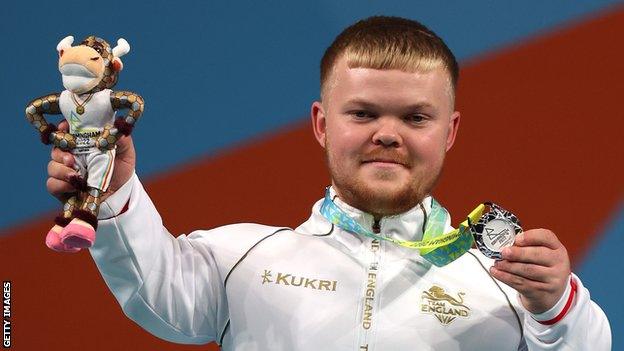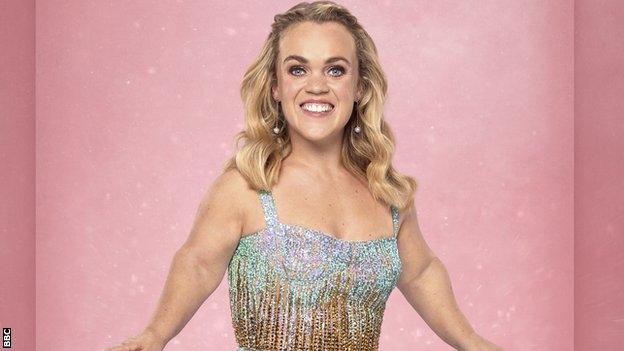'I want to show what short-stature athletes are capable of' - Swan targets Para-powerlifting success
- Published

Swan was one of three English medal winners at the Para-powerlifting events in Birmingham
He's the Commonwealth Games medal-winning, Taylor Swift-loving, crowd-pleasing rising star of the Great Britain Para-powerlifting team.
Mark Swan trains in his shed, can lift more than three times his body weight and has one thing on his mind - European Championship gold.
Swan is part of a 12-person GB team at the event in Georgia. His -65kg event is on Saturday's opening day, with competition running until Thursday, 29 September.
And after winning silver for England in the lightweight division in Birmingham, the 21-year-old, who goes in ranked as number one in his division, wants to go one better.
"I've never done two big competitions back-to-back before and maintaining momentum is tough," he tells BBC Sport.
"I didn't have any time off after the Commonwealths to try to maintain my strength before the Europeans, but hopefully it will be worth it.
"I've put myself in a good place but I just need to stick to my gameplan and hopefully I will come away with the gold. It would be a step to what I want to achieve in 2024 - Paralympic gold in Paris."
Swan tried powerlifting for the first time at a Dwarf Sports Association UK event when he was 16.
On the biggest stage of his career so far, his Commonwealths got off to a rocky start when the first of his three competition lifts was disallowed.
But he recovered superbly to lift a personal best of 202kg from a bodyweight of 66.1kg and finish second, 9.1 points behind Tokyo gold medallist Bonnie Bunyau Gustin of Malaysia, who lifted 220kg for 154.6 points.
"We knew he would win because he is strong, but we didn't know what would happen with the silver and bronze," he admits.
"I wasn't necessarily going in expecting to get a medal, but I was ready for a fight and was going to give it my best chance.
"To realise that I could maybe get a silver gave me a burst of energy. But it is easy to let that get the better of you.
"I'm quite chilled out of competition but when it comes to competition I get confident and have that little swagger to get myself ready.
"I was maybe a bit too excited and giddy before that first lift and it put pressure on me for my second and third lifts but I learned that if you do fail with your first lift there is no need to be stuck, just forget about it and move on to the next one."
Swan's pre-competition routine involves using some loud motivational rock music to get pumped up before a blast of Swift in the moments before lifting.
And it is a similar music routine in his training set-up at his home in Seaham, near Sunderland. There he splits his time between the garden shed, where dad Paul plays a key role in his training, and a local gym.
"I want to show what we are capable of as short-stature athletes," he says.
"I have the biggest bench at the gym I train at and I am the only one with a disability.
"Yes, I have smaller arms and I don't need to press as far, but what I say to anyone is 'you put the same weight on as I do and try to press as far as I do' and they've tried and they can't."

Simmonds is the latest Paralympian to appear on the BBC dance show
Swan is also keen to see what impact the appearance of Paralympic swimmer Ellie Simmonds on this year's series of Strictly Come Dancing can have.
"Having a disability doesn't label you and doesn't mean you can't do it," he says.
"People born with a disadvantage in some aspects are still more than capable of doing what people with no disabilities can do.
"Ellie being on Strictly is really good to help raise awareness. To have someone with short stature on a programme like that and to see how it will play out and look will be really interesting and will hopefully make a positive difference."